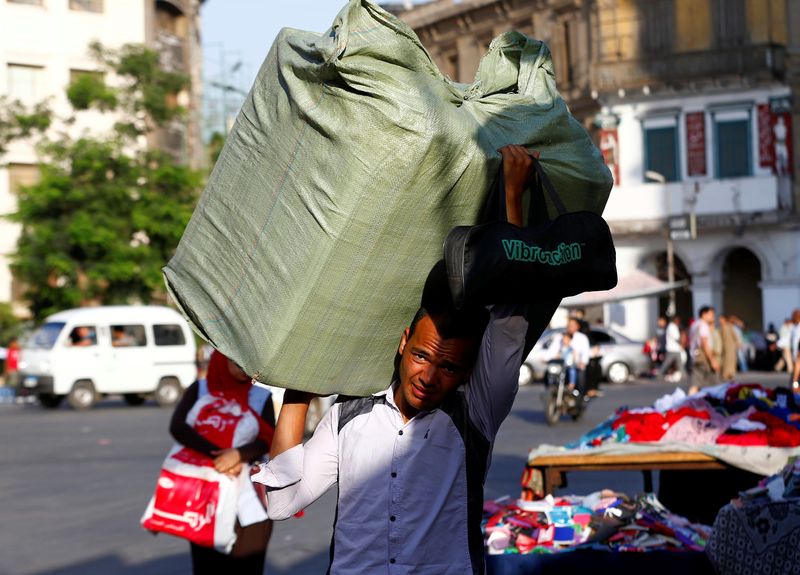By Mike Dolan
LONDON (Reuters) – For all the trepidation about world trade, debt and inflation, it could well be worker shortages that define economic trends this year – on both sides of the Atlantic.
Immigration curbs and deportations form a central plank of the agenda of President-elect Donald Trump, who returns to the White House on Monday. If he follows through with these plans, up to 1 million illegal migrants could be deported over the next two years and U.S. population growth could slow as a result.
Meanwhile, in Europe, there’s growing speculation that a durable ceasefire between Ukraine and Russia could see many refugees and migrants currently spread across Europe begin to head home.
More than 4.3 million Ukrainians have fled the country since Russia’s invasion in 2022, with more than 1 million settling in Germany alone. Many Ukrainians were given legal rights to live and work in Europe in a 2022 European Union directive. The prospect of losing at least some of these workers is already prompting concern in some central European nations.
A significant decline in workers at this juncture – when labour markets in many economies remain hot despite the severe borrowing rate spike over the past two years – is rekindling concerns that some countries could face a potentially stagflationary supply squeeze.
The prospect of a fresh upturn in wage inflation is just one more headache for central banks that otherwise seem keen to roll back the interest hikes of 2022 and 2023.
LABOUR MARKET HEAT
The International Labour Organization, a U.N. agency, said on Thursday that the global jobless rate remained at a historic low of 5% last year. It forecast that the rate would stay there in 2025, dipping further to 4.9% next year.
And mapping out longer-term ageing and fertility trends to illustrate how ebbing labor supply is affecting that, JP Morgan strategists noted the working-age population in developed economies as a whole looks to have peaked at 746 million in 2023 and is projected to fall by 47 million through 2050 based on U.N. forecasts.
This all sets the stage for a year that could see U.S. and European businesses experience an echo of the labour market anxieties that emerged in the wake of the pandemic.
Indeed, the heat of the U.S. jobs market doesn’t seem to have dissipated much last year.
Although difficulty in hiring on an aggregate level appears to have returned to pre-pandemic levels, U.S. small business surveys continue to flag acute worker shortages in key sectors such as transportation, construction and manufacturing.
With one-fifth of small firms planning to pick up hiring in the next three months, almost 90% of those looking to recruit reported no or few qualified applicants. And the number of businesses saying labour costs were their single biggest problem was just 2 percentage points below 2021’s extremes.
This then throws a spotlight back on Trump’s proposed migration curbs and deportation plans. Some 8.3 million U.S. workers were estimated to be illegal migrants as recently as 2022.
MACRO DRIVER
Migration has been a critical macro driver over the past two years and likely a key reason why the U.S. economy was able to continue to create a significant number of jobs without generating an inflation spike.
The U.S. Congressional Budget Office last February sharply increased its estimate for net immigration through 2023, forcing economists to rethink their expectations for sustainable payroll growth in 2024.
However, those migration numbers have ebbed significantly since then, not least due to a mid-year asylum ban from President Joe Biden’s administration that’s estimated to have already cut monthly net migration by one-third compared with 2023.
Trump’s proposed deportations could tighten things much further, and investors are therefore starting to see Trump’s migration agenda as potentially more economically important than even his tax or tariff promises.
Morgan Stanley (NYSE:MS) reckons Trump’s plans could see deportations of about 1 million migrants over one to two years, and a decline in population growth from 1.2% in 2024 to 1.0% or less this year.
Schroders (LON:SDR) economists think “the greater threat to inflation probably comes from a crackdown on immigration, along with mass deportations, if it leads to labour shortages that would ultimately result in higher wages and services inflation.”
The Schroders team cite Peterson Institute estimates that mass deportations could add 3 percentage points to inflation compared to a bump of one point from a 10% tariff hike. They reckon such a supply shock could cut potential GDP growth down to 1.5% from more than 2% currently.
And Invesco argues that if deportation negatively impacts growth and creates a stagflationary environment, “a significant stock market downturn” would ensue.
The details surrounding this debate – including whether deportations will be partially offset by working visas for skilled migrants – are numerous.
But migration and fears about a shrinking workforce have clearly become a key macro investment variable that perhaps should dominate market thinking around Trump’s inauguration next week.
The opinions expressed here are those of the author, a columnist for Reuters.
(By Mike Dolan; Editing by Jamie Freed)




























